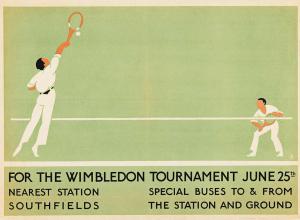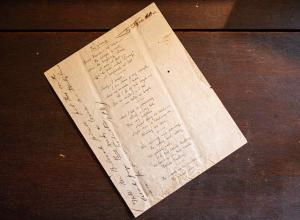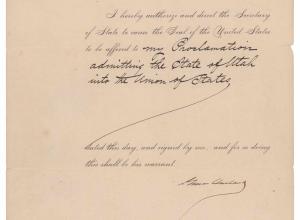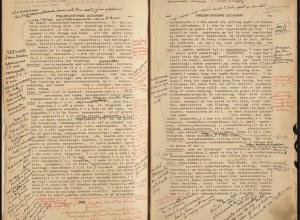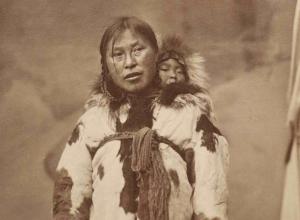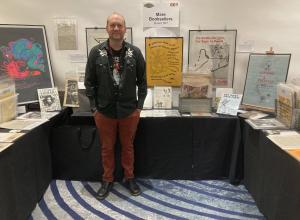Library of Congress Acquires Legendary Comedian Jerry Lewis’ Personal Archive
"The Geisha Boy," "The Bellboy," "Cinderfella," and "The Nutty Professor" are all among the many motion pictures that personify the comedic genius of Jerry Lewis. The Library of Congress announced today that it has acquired a trove of documents, films and other media that provide a unique window into the world of a man who has spent more than 70 years making people laugh.
In celebration of the materials arriving at the nation’s oldest federal cultural institution, Lewis will perform at 8 p.m., Friday, Oct. 9, at the historic State Theatre in Culpeper, Virginia in cooperation with the Library of Congress. "An Evening with Jerry Lewis" is a ticketed event. For more information, visit the State Theatre’s website or call (540) 829-0292.
Before the concert, Lewis will tour the Library of Congress Packard Campus in Culpeper to see where his collection will be stored and preserved as part of the nation’s artistic and cultural patrimony. The collection will complement the Library’s existing collections of iconic humorists, including Bob Hope, Groucho Marx, Danny Kaye, Lucille Ball and Desi Arnaz, Sid Caesar and Johnny Carson.
"Many of us know Jerry Lewis through his comedy, in film and onstage, or for his humanitarian work," said Librarian of Congress James H. Billington. "Lewis is one of the few comic auteurs. This collection will give the world a more complete picture of his life as a performer, director, producer, writer, recording artist, author, educator and philanthropist. He is one of America’s funniest men, who has demonstrated that comedy as a medium for laughter is one of humanity’s greatest gifts."
"For more than seven decades I’ve been dedicated to making people laugh. If I get more than three people in a room, I do a number," Lewis joked. "Knowing that the Library of Congress was interested in acquiring my life’s work was one of the biggest thrills of my life. It is comforting to know that this small piece of the world of comedy will be preserved and available to future generations." Lewis donated portions of the collection; the rest was acquired via purchase.
The Jerry Lewis Collection contains more than 1,000 moving image materials and paper documentation that cover the entire span of his remarkable career—from an early screen test made years before his movie debut to extensive amounts of test footage, outtakes and bloopers from his self-produced and often self-directed Hollywood productions.
The collection also chronicles his television career, including his appearances with his onetime partner Dean Martin on the "Colgate Comedy Hour" (NBC, 1950-1955), full runs of his various variety series and guest appearances on programs like "The Tonight Show." Lewis received copies of virtually every television appearance he ever made, including "Tonight" show episodes, that don’t exist anywhere else. Other now-obscure programs such as "Broadway Open House" are also in the collection.
In addition, there are home movies, films given to Lewis as gifts (such as the 35 mm print of "Modern Times," which was given to him by Charles Chaplin), videos of his lectures given while instructing at the University of Southern California School of Cinematic Arts, filmed nightclub appearances both with and without Martin, and footage from his legendary work on the Muscular Dystrophy Association Telethon.
Collection highlights include:
- 35 mm prints and pre-prints of many of Lewis’ most popular films including "The Bellboy," "The Errand Boy" and "The Family Jewels."
- A rare autographed picture of famous silent comedian Edgar Kennedy.
- Test footage—of costumes, make-up, camera and actor screen tests—from some of Lewis’ leading films, including a complete one-reel silent comedy filmed on the set of "The Patsy."
- Home movies of Lewis at work and play, featuring such notables as his rock-star son Gary Lewis, comedian Milton Berle at Disneyland in 1955 and Lewis and Dean Martin on the set of "Pardners."
- Fully scripted motion pictures produced by Lewis at home, which often starred Lewis’ neighbors Tony Curtis and Janet Leigh. Titles include "Fairfax Avenue" (spoofing "Sunset Boulevard") "Come Back Little Shiksa" and "The Re-Enforcer," starring Dean Martin.
- Rare footage of Martin and Lewis doing their nightclub act.
The Jerry Lewis Collection will be available to qualified researchers in the Library’s Motion Picture and Television Reading Room in Washington, D.C. Processing of the collection continues, but much of it is currently available to researchers. A small portion of the collection, however, will be restricted for 10 years.
Lewis was born Joseph Levitch in Newark, New Jersey on March 16, 1926. Born into a vaudeville family, Lewis started performing at the age of five. In 1945, he met crooner Dean Martin and a year later, they formed the comedy team Martin and Lewis. The famous duo became an instant hit in nightclubs, film, radio and television. After performing with Martin for more than a decade, Lewis became a successful solo actor and director and Martin embarked on a singing-acting career.
Lewis also turned his talents toward teaching and charitable work. He received several lifetime achievement and humanitarian awards. He has been honored by The American Comedy Awards, the Los Angeles Film Critics Association and has two stars on the Hollywood Walk of Fame. He received the Academy of Television Arts & Sciences Board of Governors’ highest Emmy Award, was nominated for the Nobel Peace Prize in 1977 for his humanitarian efforts and received the Jean Hersholt Humanitarian Award at the 2009 Academy Awards.
The Library of Congress Packard Campus for Audio Visual Conservation is a state-of-the-art facility funded as a gift to the nation by the Packard Humanities Institute. The Packard Campus is the site where the nation’s library acquires, preserves and provides access to the world’s largest and most comprehensive collection of motion pictures, television programs, radio broadcasts and sound recordings (www.loc.gov/avconservation). The Packard Campus is home to more than 7 million collection items. It provides staff support for the Library of Congress National Film Preservation Board (www.loc.gov/film), the National Recording Preservation Board (www.loc.gov/rr/record/nrpb) and the national registries for film and recorded sound.
Founded in 1800, the Library of Congress is the nation’s first-established federal cultural institution. It seeks to spark imagination and creativity and to further human understanding and wisdom by providing access to knowledge through its magnificent collections, programs, publications and exhibitions. Many of the Library’s rich resources can be accessed through its website at loc.gov.







